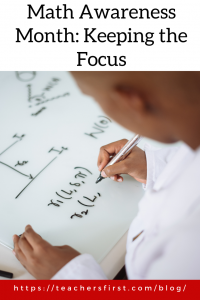Teachers and students often fear mathematics and poetry—complex math problems and poem interpretation present unique challenges. April is Mathematics and Statistics Awareness Month and National Poetry Month. Albert Einstein wrote, “Pure mathematics is, in its way, the poetry of logical ideas.” Since mathematics governs the structure of poems like Haikus and sonnets, it’s a prime time to celebrate math and poetry in April!
The official Mathematics and Statistics Awareness Month site, a Joint Policy Board for Mathematics program, states the celebration’s goal is to increase the understanding and appreciation of mathematics and statistics. In addition, Mathematics Unites, the 2022 theme, focuses on using mathematics as a common subject and language to connect diverse groups of people through the common topic of mathematics. Listed below are some of my favorite mathematical resources and strategies to keep the focus on celebrating mathematics and statistics year-round.
TeachersFirst Math Resources
Our math special topics collections (reviewed here) are curated lists of resources based on the NCTM standards. Use this list to share resources with your colleagues to enrich, reinforce, or reteach concepts in your math classroom. Each reviewed resource includes a description and technology integration ideas for your classroom.
Math and Poetry
Use the work of Shel Silverstein to demonstrate how poetry and math can complement one another. Smart or The Googies Are Coming both lend themselves to short cross-curricular activities and discussions about money. Your class could explore point of view with the poem One Inch Tall. You could also pull a few of Silverstein’s poems together to deliver a longer lesson. Older students might even like to try their hand at math poetry themselves and enter the Math Poetry contest.
Math Autobiography
Challenge your students to research mathematicians and learn about their life. Living Proof: Stories of Resilience Along the Mathematical Journey is a freely downloadable book of stories from the American Mathematical Society about people from diverse backgrounds who’ve taken various paths. Then have the students write their math autobiography and share their story as a presentation using Microsoft Sway (reviewed here) or a podcast with Anchor (reviewed here).
Math and Art
Unite your students’ love for art and mathematics by visiting Jo Boaler’s Youcubed site (reviewed here). Explore the Maths and Art section of the site for lessons on exploring art through the lens of mathematics. Encourage your students to create artwork connected through math. Display the students’ work on Google Slides (reviewed here).
Math Scavenger Hunt
Focus on math awareness in your school and community by organizing a digital math scavenger hunt on math concepts using Goose Chase Edu (reviewed here). Place math problems around your school or community or challenge the participants to find shapes around their house or town.
Math Night
Hosting a math night helps families learn about strategies and resources to help them support their children. Have your students plan math challenges for their families to complete and demonstrate what they’re learning in the classroom. Invite the community and school board representatives to share how math is connected in their fields to increase the visibility of mathematics in the real world.
Promoting math awareness throughout the year is crucial to developing future problem solvers and critical thinkers. What strategies and resources are you using to focus on math awareness during April and beyond? We’d love to hear them in the comments below!


